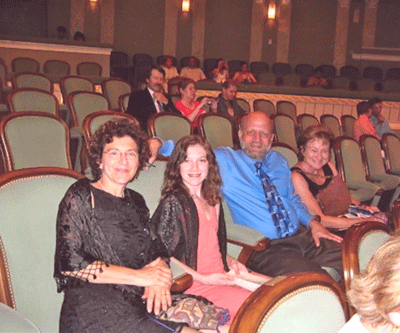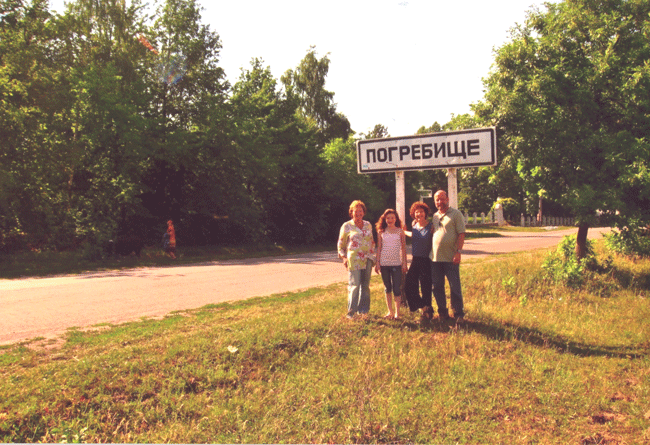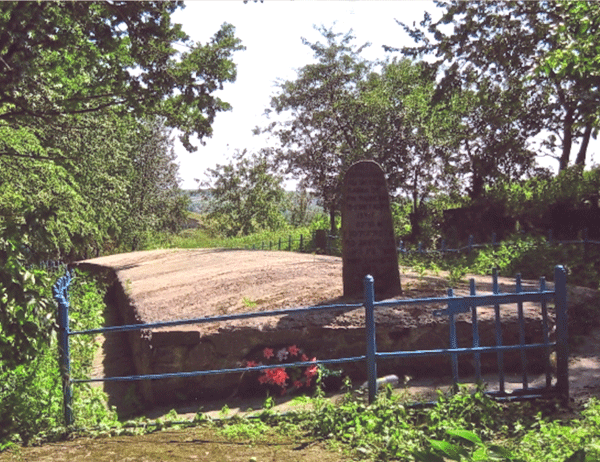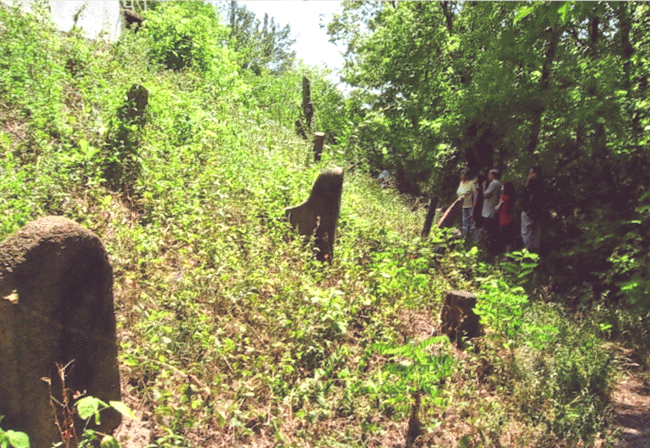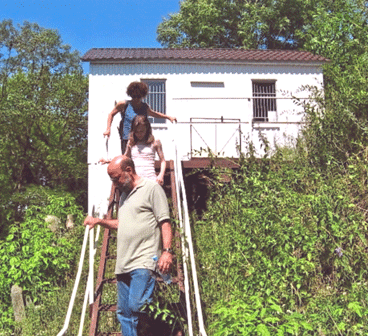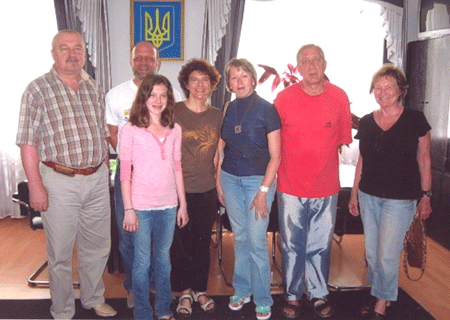The Road to Pogrebische |
||||
This summer our family took a remarkable trip to Ukraine to search for our roots. I recommend such a journey to everyone. Visiting the lands of your ancestors will enhance your understanding of your family history. More importantly, you will appreciate their arduous migrations to America which have allowed you and your children to reap the blessings of liberty and abundance so often absent from many of our ancestral homelands. We were four on this journey — my wife, Kate Michaels, my daughter Michelle Katcher age 14, and my cousin Jackie Efrusy Henderson, a psychologist from Westlake, California. Jackie is quite the world traveler — Tibet, India, China, Cuba, Africa. We had discussed making this trip for years. She finally recently declared that at age 67, we had better get going or the trip would never happen. Jackie and I share several common ancestors — her father Jack Efrusy and my mother Molly Efrusy Katcher were siblings, so we have two grandparents in common — Sam Efrusy and Pauline Katcher Efrusy. The Katcher-Efrusy family includes inbreeding common in insular societies like the Jews of Eastern Europe. The short version of "I'm My Own Grandpa" is that my parents were first cousins because their mothers, my grandmothers, were sisters. My father Archie Katcher's mother's maiden name was Rebecca Katcher. She married my paternal grandfather Lewis Katcher, probably her cousin, to become Rebecca Katcher Katcher. Rebecca's sister Pauline Katcher, grandmother to Jackie and me, married Sam Efrusy, probably her cousin, and had among other children Jack Efrusy and my mother Molly Efrusy Katcher. Before we started our journey we knew little of our grandparents' life in Ukraine. Our grandmothers were born in Kazyatyn, a major railroad transit point southwest of Kiev founded in 1874, now with a population of about 25,000. They had come to America from Pogrebische, a village of about 12,000 founded in 1230 about 25 miles from Kazyatyn. Both communities had once been home to substantial Jewish populations that were depleted by pre and post WWI pogroms, a severe famine in 1932-35 brought on by ruthless Soviet collectivization, the Holocaust, and the emigrations of the 197os and 1980s to Israel and the West. We had little expectation of finding living relatives, but faintly hoped that we might encounter people who looked like Jackie, Michelle or me, or knew the names Katcher and Efrusy. We started by spending a week in Moscow and St. Petersburg. Both are beautiful and vibrant modern cities, with well preserved 18th and 19th century architecture, and charms that rival the great capitals of Western Europe. English, dollars and credit cards are readily negotiated with very friendly people in these cosmopolitan environments. Both cities have museums, churches, palaces, monuments, parks, hotels, restaurants, metro systems, music and theater offerings of the highest order. |
||||
Kate, Michelle, Jon and Jackie at the Bolshoi Ballet production of Swan Lake. |
We were able to maintain Michelle's wavering adolescent interest by attending ballets, including a spectacular performance of Swan Lake at the Bolshoi in Moscow (I had never seen so many tutus), with the Queen of Thailand in the Royal Box. This rates as among the best live performances I have ever seen — right up there with the legendary James Brown Band of the early 1970s and "The Producers" on Broadway with Nathan Lane and Matthew Broderick. We also saw a very exciting avant garde ballet production of Romeo and Juliet in St. Petersburg. |
|||
We visited several Czarist palaces, including one in St. Petersburg that rivaled Versailles, which on the day of our visit was being lavishly set up for the wedding of a prima ballerina. Elton John, who was performing outdoors in downtown St. Petersburg during our visit, had wanted to get married in this grand palace, but the Russians, not yet ready for same sex nuptials, told him it was "not available." These palaces are all the more remarkable because they had been utterly destroyed by the Germans as part of their three year siege of then Leningrad. The Russians had been able to remove much of the Czars' art and personal effects, but the Germans completely devastated the buildings.In a remarkable testament to national pride, the Russians, using photographic records, were able to fully restore these priceless relics of a lost world. Guided tours of these palaces include mind numbing chronologies of the czars and czarinas and their mafia like intra-family intrigues including homicides, adulteries, bastard children, imprisonments and banishments. Visits to these palaces are enhanced by the presence of brides and grooms making the rounds of these and other sites on their wedding days. Walking these spectacular grounds one encounters many brides in their wedding finest followed by friends and family with bottles of champagne. That the Queen of Thailand was on the grounds (she seemed to be following us around Russia) along with these many queens for a day, added to the poetry of the occasion. An incident on the streets of St. Petersburg reflected the tremendous disparity of wealth, and the prevalence of corruption, that have accompanied Russia's less than perfect transition from Communism to Capitalism. One sees in Moscow and St. Petersburg expensive luxury cars of all types and origins. At the same time Russian streets and roads have ever present traffic police who need only point their white tipped batons in order to compel drivers to pull over. One bright evening we were walking back to our hotel down the Nevsky Prospect, St. Petersburg's main drag. Suddenly we heard and then saw a group of about twenty luxury cars (Porsches, BMWs, Lexus, Mercedes, Audis) with young people honking their horns, playing loud rap music, hanging out windows and sun roofs, waiving cell phones and camcorders, shouting boisterously. Suddenly a Mercedes sedan pulled into the area of the street that was empty due to the red light. The Mercedes began doing 360 degree donuts, spinning its tires, burning rubber, and almost colliding with a bus. When the light changed the raucous drivers noisily continued down the street in formation. There must have been one hundred witnesses to this circus, but not a traffic cop in sight, even when only several minutes later the same unruly motorists came back down the same street in the opposite direction in the same manner. One surmises that the police find it unwise to confront these scofflaw children of the powerful oligarches. Where Moscow is like New York and St. Petersburg is like Washington, Kiev is like Omaha, and Ukraine is like Nebraska. Kiev has a provincial feel, lacking the intense energy, bustle and prosperity of the great Russian cities. Highlights of Kiev included street musicians who offered to play Nirvana and Metallica for spare change, and a waiter in traditional Ukrainian attire who=s demeanor and mangled English perfectly channeled Steve Martin as a wild and crazy guy. We headed from Kiev for our villages in a comfortable Mercedes van, driven by Boris, with Alla as our guide and interpreter. Boris did not speak English, and the two of them argued in Ukrainian like an old couple, especially when we got lost several times trying to find the villages. Alla had done her homework and was very familiar with the history of Jews in Ukraine as well as our specific villages. As we got further away from Kiev and the main roads we started to enter "deep Ukraine" — mile after mile of enormous fields of corn, soybeans, sugar beets and buckwheat. An endless plain of black chernozem soil so fertile that the Nazis dug it up to export back to Germany. The terrain was limitless like the Great Plains of North America. Tales from World War II include German soldiers going mad as they approached crest after crest of flat lands, only to find but another crest with an endless expanse beyond. Every once in a while we came across a village with run down housing and public buildings, domestic animals in the streets, horse drawn wagons, and peasant looking people. Many roads had cobblestone surfaces that you could not drive more than 15 mph. Most villages had a Great Patriotic War (World War II) memorial and a statue of Lenin. We finally found the very funky village Pogrebische. Even the main street was full of pot holes. Jackie at first wondered where the town was — we were already there. Pogrebische looks like a modern version of Tevye's Anitevka. The economy is agriculture with a sugar beet refinery on a railroad spur. There is also a medical college. The only tourists are Jews looking for their heritage. The town administration building was a modest two story structure from the 1970s with astonishingly basic facilities in the back yard — literally a shack with a hole in the ground, no seat. |
||||
Jackie, Michelle, Kate and Jon at the Pogreleische village limits. |
||||
| We were invited into the office of the mayor, a very nice man of about 45 — Anatoli "Toli" Michaeleovic. He had a well decorated office with old furniture and a FAX. With Alla's help we told him our names and our grandparents' histories. He has lived here thirty years and never heard the names Efursy or Katcher. There are now no Jews in Pogrebische. The last, a female teacher, left three years ago for Israel with her children and grandchildren. Most of the Jews left in the 1970s for Israel and America to avoid persecution and seek a better life. | ||||
Jon, Pogrebische Mayor Michaeleovic, Kate, Michelle and Jackie. |
Toli offered us schnapps, pork, sardines, mushrooms, bread, tea and coffee. We toasted and shared very warm feelings. He told us the very sad story of his twelve year old son being hit by a car driven by the local prosecutor. The village has an annual soccer tournament in honor of the boy. We thanked Toli for his openness and expressed that we really had no idea what to expect on this quest for our roots, but this encounter and experience vastly exceeded anything we could have imagined or hoped. He was moved by our efforts to search for our roots. We were moved by his generosity and hospitality. Jackie and I felt as if we had come home. A very special moment of connection and profound sentimentality. | |||
Before WWII Pogrebische had a thriving Jewish community with a remarkable 17th century oriental style wooden synagogue that was burned by the Nazis. For an interesting illustrated note on this very beautiful synagogue see www.zchor.org/verbin/verbin.htm. In September 1941, the Germans took the entire village to the stadium, separated the Jews, told them to take their most precious belongings for "relocation," marched them to several mass grave sites and shot them all. This atrocity, which the Nazis repeated in hundreds of cities, towns and villages throughout Eastern Europe, is impossible to comprehend. The mass production nature of the gas chambers, and the ability of the Nazis to delude millions of people into cattle car trains to concentration camps, is easier to fathom than hundreds of people walking to their executions at a mass grave. One imagines that when you shoot one thousand people, victims number twenty and thereafter have a pretty good idea what awaits them and their families. Yet the Germans were able to repeatedly pull off these abominations with alacrity. Unfortunately this type of conduct has been going on in Europe for centuries, and continues to the present. The Russians executed thousands of Polish and German officers during World War II, and as recently as 1993, when Serbian forces executed 7,000 Bosnian Muslim men and boys in a single day at Srebernicia while nearby U.N. troops did nothing. |
||||
Pogrebische's Black Ravine mass grave. |
||||
| We were shown a mass grave at Black Ravine about a mile from the Pogrebische village center. A concrete slab 40 meters by 8 meters covered a pit holding 1,000 people. A stone monument placed in the 1970s recounted the event. The executions lasted over several days. Each May 9th, when Ukrainians and Russians celebrate the victory over the Nazis, people place flowers at the mass grave. | ||||
|
||||
Progrebische Jewish Cemetary. |
||||
Rabbis' Shrine. |
We were taken to a run down Jewish cemetery near the village. The upkeep of rural Jewish cemeteries is a problem in Ukraine because all the Jews have left and, therefore, there is nobody to care for them. A woman of fifty, who looked sixty-five, showed us the way. We found overgrown graves and fallen headstones. There were many ancient graves and a few from the 1970s. There was one modern shrine to two rabbis and their wives in a metal building. | |||
The next day we visited Kazyatyn, birthplace of three and perhaps four of the Katcher and Efrusy grandparents. Kazyatan is a city of 25,000, quite modern when compared to Pogrebische, with more sophisticated and diverse looking people. There is a chicken factory that supplies McNuggets to all the McDonalds of Ukraine. A major railway junction, the station has a famous restaurant, with a beautiful rotunda interior, an ornate dome and a huge chandelier that a wealthy businessman wants to buy to put in his home. Unfortunately, the water main was broken so we could not eat there. We went to the mayor's office and were hosted to coffee and candy. Mayor Visotsky summoned Svetlana, the head of the local Jewish cultural organization, and her father Vladimir. There are now about 400 Jews in Kazyatyn but no synagogue — the former synagogue located downtown, had been converted to a girls school and stripped of all Judaica. Kazyatyn has a Jewish culture school for about 100 children. The school and other social programs receive assistance from charities in America and Israel for the promotion of Jewish identity and emigration to Israel. Neither the mayor nor Svetlana recognized the names Katcher or Efrusy. The deputy mayor had a registry of Jews killed in the Holocaust — no Katchers or Efrusys. The deputy mayor made copies of our family documents and photos for the local museum. |
||||
Kazyatyn Mayor Visotsky, Jon Michelle, Kate, Svetlana, Vladimir and Jackie. |
||||
While we did not find any living relatives in Ukraine, we certainly connected with our geographical origins. It was very valuable to see and feel the land where our grandparents lived and from which they departed. The overarching feeling for me was one of thanks for their having left. This is a tough place. Things are improving, and the 550,000 Jews of Ukraine are doing fairly well. Indeed, one third of the Ukrainian parliament is of Jewish national origin. But the 20th century has been a very difficult time for all Ukrainians, especially the Jews. Pogroms, wars, collectivization, famine, genocide, and persecution. The odds were not good for those Jews who stayed. Given that my parents were first cousins the probability is high that I would have been "me" in Ukraine. But the probability is even higher that my parents would not have survived to give birth to "me" in 1954. My gratitude to my grandparents for their having come to America arises from more than the relief of biological survival. Returning home I had a profound awareness of how lucky we are that all of our ancestors came here and worked so hard to create what is 21st century America: the liberties we enjoy; our freedom from fear due to our enviable rule of law; our comforts and abundant goods and services. Such is not the norm in most of the world, and indeed too many Americans have not yet achieved these standards. My gratitude is not some flag-pin-wearing chauvinism that America is better than the rest of the world and, therefore, has the right to imperially dictate its will upon weaker nations. Rather, it is a recognition that with these gifts come responsibilities: to raise healthy families; to work hard and be the best we can at whatever we do; to be active in our communities in order to improve life for all people wherever possible. It is through the pursuit of our better selves that we best honor those who struggled mightily to come here and make our wonderful lives possible. Jonathon A. Katcher |
||||
